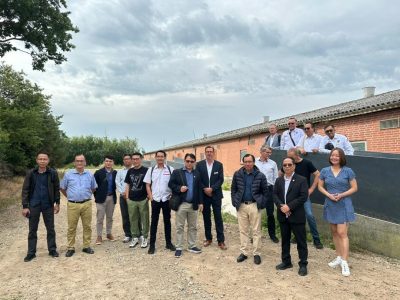The East Malaysian state of Sarawak has announced an ambitious plan to achieve USD 220 million in live pig exports by 2030, supported by the expansion of large-scale farming projects and adoption of advanced technology.
Dr Stephen Rundi Utom, Minister of Food Industry, Commodity and Regional Development, said the state is confident of reaching the target once three new pig production facilities become fully operational.
To accelerate progress, Dr Rundi recently led a nine-day working mission to Denmark, home to one of the world’s most advanced pork industries.
Taking cues from Denmark
The delegation visited leading agrifood companies and institutions, including Big Dutchman, a global provider of livestock equipment and feed processing; DanBred, Denmark’s largest pig breeding firm; Danish Finest Chicken, a halal-certified poultry processor; and Danish Crown in Horsens, widely regarded as the most modern pig slaughterhouse and processing plant in Europe.
Meetings were also held with the Danish Food and Veterinary Council to study border control systems and livestock transportation, as well as with Techcollege on slaughterhouse training and modular abattoir technology.
Sarawak aims to replicate Denmark’s success in productivity, disease prevention, and food safety. Denmark’s pork industry contributes roughly 30% of its agricultural GDP and maintains a pig population of 11.45 million, with 90% of production exported to 140 countries.
Sarawak is particularly focused on strengthening its defenses against African swine fever and foot-and-mouth disease while creating opportunities for foreign investment.
Sarawak in export mode
Currently, Sarawak exports around 112,700 live pigs annually to Singapore, worth USD 37.5 million. Green Breeder Sdn Bhd, the state’s largest exporter, ships about 2,000 pigs weekly to Singapore and recently expanded into West Malaysia with shipments to Selangor, with Penang and Johor next in line.
The state has already made significant investments in infrastructure. Its first centralized pig farm, launched in 2010, consolidated breeders from Kuching, Serian, and Samarahan to reduce pollution and improve biosecurity. Since 2017, the farm has exported more than 350,000 pigs valued at USD 68.8 million.
A second farm in Serian will accommodate 50,000 pigs by 2030, while a third facility in Sibu, covering 232 hectares, is designed to produce 150,000 pigs annually with modern disease detection systems.
Capacity building
To build long-term capacity, Sarawak will also establish a new School of Veterinary Medicine in Semanggok through a partnership with Universiti Putra Malaysia.
Dr Rundi emphasized that with strategic investments, modern systems, and global partnerships, Sarawak is determined to evolve into a net food exporter by 2030.

